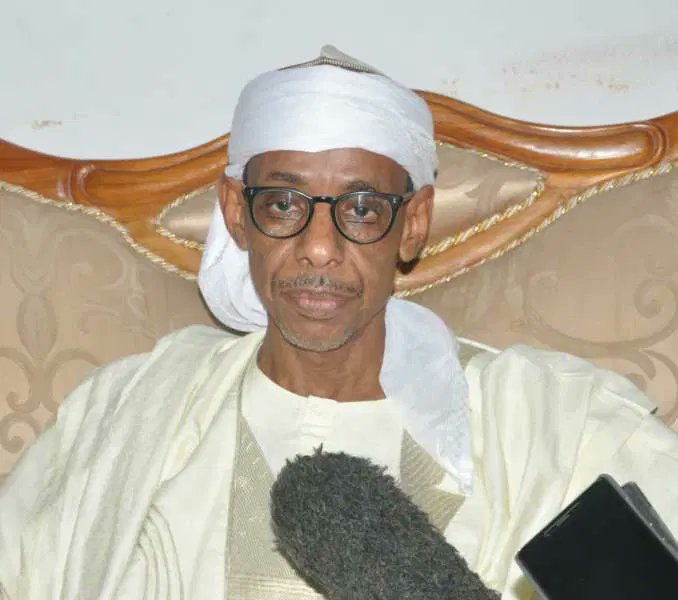
“Nigeria Is Bleeding Under APC Rule”— Baba-Ahmed Warns of Grim Future Ahead

As Nigerians continue to grapple with economic hardship, insecurity, and a deepening sense of national uncertainty, the vice-presidential candidate of the Labour Party in the 2023 general elections, Dr. Yusuf Datti Baba-Ahmed, has issued a dire warning about the country’s future under the All Progressives Congress (APC)-led government. Speaking in a tone both serious and impassioned, Baba-Ahmed declared that Nigeria's future is bleak as long as the APC remains in power, insisting that the current administration has failed in nearly every area of governance and continues to steer the country toward an avoidable disaster.
His remarks, which have sparked a flurry of reactions across political, civic, and online platforms, paint a grim picture of a nation on the edge. According to Baba-Ahmed, the APC government has done more harm than good, failing to deliver on its promises of economic reform, security restoration, and good governance. Instead, he accuses the ruling party of dragging Nigeria into deeper poverty, enabling corruption, and weakening the very fabric of democracy through impunity, manipulation, and disregard for the rule of law.
Baba-Ahmed’s comments come at a time when millions of Nigerians are battling soaring food prices, a weakened naira, high fuel costs, widespread unemployment, and growing disillusionment with the political class. In his view, the APC’s leadership has been characterized by deception and incompetence, as the party continues to blame previous governments while doing little to solve the real problems plaguing ordinary citizens. He stressed that the government has shown no serious strategy for economic recovery, nor has it demonstrated genuine political will to confront corruption or insecurity.
Citing the worsening state of national unity, Baba-Ahmed lamented that the APC has not only failed to unite Nigerians but has also deepened divisions along ethnic, religious, and regional lines. The rhetoric of change, he said, was only a campaign slogan that has since turned into a cover for mismanagement and anti-people policies. He warned that unless the citizens rise up democratically to reject the current system, the nation risks drifting into irreversible decline.
Dr. Baba-Ahmed also criticized what he called the militarization of politics, saying that the ruling party has undermined democratic values by deploying security forces against opposition voices and suppressing peaceful dissent. According to him, the APC’s style of governance is eroding civil liberties and laying the foundation for authoritarianism, all under the guise of protecting national interest.
The Labour Party stalwart, who was widely praised for his calm demeanor and articulate views during the 2023 campaigns, accused the APC of being obsessed with power rather than service. He noted that the leadership appears more focused on internal power struggles and political survival than on delivering policies that would lift millions out of poverty and stimulate growth. He warned that with the country’s debt profile ballooning and inflation crippling small businesses, the common Nigerian is now left to fend for themselves in a system that is structurally rigged against them.
His warning resonated with many Nigerians who have taken to social media to express similar frustrations. Hashtags like #APCFailedUs and #RescueNigeria have started trending once again, with citizens sharing their daily struggles in a nation where living conditions have deteriorated rapidly. From students who can’t afford tuition to farmers fleeing bandit-infested lands, the cries for help are growing louder, and Baba-Ahmed’s voice has amplified what many believe is the truth they’ve been living through.
While APC supporters have pushed back against Baba-Ahmed’s claims, labeling them as political rhetoric from a bitter opposition figure, others believe his comments reflect the mood of the nation. Critics argue that the APC government has had enough time to prove its worth but has instead recycled the same excuses and failed policies since taking over in 2015. Promises of fighting corruption, ending Boko Haram, fixing power supply, and diversifying the economy have largely gone unfulfilled, leaving the country in a cycle of stagnation and crisis.
Baba-Ahmed insists that it is not just a matter of party politics but one of national survival. He urged Nigerians to reject the culture of fear and intimidation and begin to demand transparency, accountability, and competent leadership. He called on youths, civil society, religious leaders, and the private sector to stop sitting on the sidelines and instead join in the movement to reclaim the soul of the nation.
According to him, the hope that once flickered during the 2023 elections is not entirely extinguished. While the election results may not have gone in their favor, he believes the political awakening it inspired, especially among the youth, is a force that cannot be ignored. He encouraged Nigerians to stay politically active, hold their leaders accountable, and prepare for future elections with a renewed sense of purpose and unity.
Baba-Ahmed’s bold declaration may be seen as controversial, but it underscores a growing sentiment that Nigeria is at a critical crossroads. Whether or not one agrees with his political alignment, it is difficult to ignore the visible strain on the country’s institutions, economy, and people. The question that looms large is whether the current government is willing—and able—to change course or whether the warnings like Baba-Ahmed’s will go unheeded until it is too late.
As Nigeria marks another year under APC leadership, the alarm bells rung by opposition figures like Baba-Ahmed may very well be a reflection of a nation standing on the edge, waiting for either revival or collapse. Whether history will remember this moment as a turning point or a missed opportunity remains to be seen. What is certain, however, is that the voices demanding change are not growing quieter—they are only getting louder.


